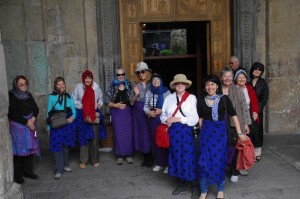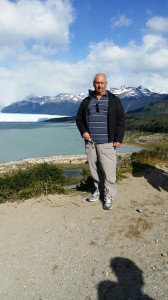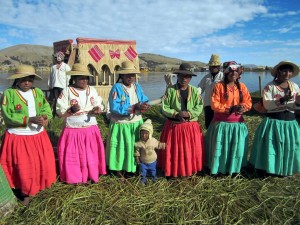
Educational tourism is booming. But it’s not new in Australia’s adult education sector. The WEA in Adelaide and Sydney have a long history of offering courses where students travel with a tutor on trips from Egypt to Estonia, Greece to Greenland.
Vic Costi went on his first educational group tour with Adelaide WEA in 2005. It was his first group tour and his first trip to Vietnam.
‘It was an absolute eye-opener. It was a fantastic way of catching up on all that I’d missed. The pre-tour lectures and talks, and then the guides who had so much insight into the culture helped me discover this rich history that goes back thousands of years. When I came back I was a walking ad. I told everyone I knew.’

That first trip ignited a passion Vic didn’t know he had. A high school science teacher, Vic had had little background in geography or history. ‘I’ve got a hunger for history. When I got home I read a lot about Vietnam’s ancient imperial past and I wouldn’t have done that unless I’d been on that tour.’
Learning tours go deeper into culture, history
Travelling as a group and with a focus on learning offers a much deeper experience of a place, Vic says. ‘I’d done quite a bit of travelling and I’d been to Europe as an independent traveller. I didn’t know it at the time, but I missed out back then because I didn’t know about the culture and history.’
He’s recently returned to European travel, this time as part of an educational tour and with a different perspective. ‘Even though I had a lot less time there than I had previously I got more out of it. In the past, I could never figure out why some of those European states were always bickering. Now I know that it all comes back to historical events and the phenomenal architecture and artwork that you enjoy as a tourist has been accumulated through plunder.’
He’s since done another 11 tours including Eastern Europe, the Baltic states and Spain, Laos, Cambodia, Thailand, Borneo, China, Africa, USA and South America. He’s since added Antarctica to his list. ‘I can now say I’ve set foot on every continent on earth.’
He finds it hard to name a single highlight. In Borneo he saw orangutans in the wild, and China was ‘a phenomenal learning experience’ because the tour leader had lived there for years.
Vic’s currently fascinated with South America. ‘The history fascinates me. In Peru the imposition of Spanish religion, education and culture almost wiped out indigenous culture but that’s now being recovered. We can learn a lot from the way indigenous people in Peru interact with their environment. They respect the land and the rivers and it’s tied to their ancient religion. It’s in complete contrast to the Spanish who raped the land, mining it for silver and gold. It’s really made me reflect on my own attitudes and my relationship to the environment.’
He’s planning his next trip as a tour leader taking a group of students to the Ecuadorian Amazon and the Galapagos Islands. For Vic it’s an exciting prospect, combining his interest in biology, the outdoors and natural history.
A tour leader teaches by taking you off the beaten track
Bob Stone has been a tour guide with the WEA in Adelaide since 2001 when he was invited to help run a trip to Egypt. He’s got a PhD in archaeology and is Senior Trench Supervisor at the Pella archaeological site in Jordan where he’s volunteered for the last 17 years.
Bob says a tour leader who knows and loves the region you’re visiting makes all the difference. ‘My job isn’t to take you to the right shops. It’s to take you off the beaten track and open doors to aspects of a culture or a country you might not have seen otherwise.’
That might mean having your photo taken with a wedding party in a village in Armenia, or sitting down in a family home in Morocco to share a local meal.
Planning an itinerary that will offer new experiences to a group is easy for a tour guide, Bob says. ‘None of us are going to recommend places we don’t want to go to or things we don’t want to do,’ Bob laughs.
He’s just back from a 23-day tour of Azerbaijan, Armenia and Georgia with a group of 21 people who he said were well travelled but wanted a new adventure. ‘They wanted to experience new customs and new sights and they got it in spades.’
In preparation for a tour, Bob does an enormous amount of reading and information gathering. He writes a booklet for the group including historical and cultural information and gives a 3-hour public lecture about the region. The aim is for participants to be reading and thinking and asking questions about a place before they visit. This enhances their enjoyment and appreciation when they see it first hand.
Getting the most out of learning tours
The attitude of participants has a lot to do with the success of a tour too. To get the most out of an educational tour Bob says, participants need to actively participate. Something as simple as learning some words and phrases of the local language can make a big difference.
‘Even if they don’t speak the language I always say “Have a try. Even if you make a pig’s ear of it, the person you’re talking to will really appreciate you trying to communicate.”’
Group members also bring skills and knowledge that add to the trip. On a recent tour to Vietnam, one of the group members was a veteran returning for the first time. ‘He was there to get rid of some devils, and it was quite an emotional trip for him. But he gave us great insights into the place.’
Another tour member, a professional jazz pianist, staged an impromptu concert in the hotel lobby, drawing in a crowd of hotel staff and tourists who sang along, made requests, and got thoroughly involved.
As the guide Bob also has to keep track of the details as well as being flexible. ‘I have to check if hotel rooms are OK, buses arrive on time, and that I’ve got a good relationship with the local guides. It’s hard work running a tour. Not everyone in the group wants to do the same thing at the same time, so I have to be able to accommodate everyone’s needs.’
It can be stressful. ‘I always lose weight on a tour. Sometimes there are conflicts in the group that you have to smooth over. Occasionally someone gets sick or overestimates their physical capacity and has trouble keeping up. Or someone will go shopping and get lost while we are all waiting for them at the bus. But by the end of the tour you’ve forgotten all those things.’
‘It’s a lot of work but I wouldn’t do it if I didn’t love it. It’s great to share my love for a place, to introduce others to the people and the history. I get a thrill when I see people get something out of it, that’s a real reward.’
When the tour group arrives home there’s a letter waiting for them that includes details of their next meeting. ‘We get together and have some wine and food and I do a presentation incorporating photos and highlights of the trip and people have a real sense of accomplishment when we do that. Sometimes we plan where are going next. I’ve already got some signed up for a trip to Iran in April 2015.’
Photo credit: “Indigenous inhabitants” by David Stanley/CC-BY 2.0
Read more stories from Quest magazine.
